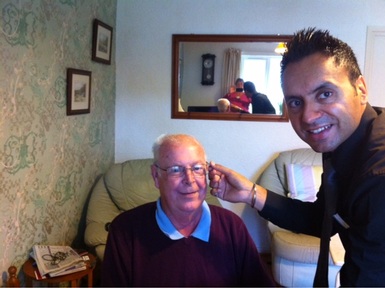Mobile optician: 'I’m often asked by patients to look at various parts of their anatomy!'
Mobile optician, Parm Mund admits many of his patients have mistaken him for a doctor, and he's had to reply, "examining anything below nose level is out of bounds!".
The Warrington-based optician tells carehome.co.uk about how he helps those who have dementia feel at ease and how he prides himself on acting as a 'counsellor', listening to the problems of patients who 'don't see people that often'.

Why did you decide to visit care homes as a mobile optician?
“I worked as a locum optician for a national domiciliary company but didn't like the fact that they used to book so many patients in for me, which meant that I didn't have time to chat with them.
“The excessive cost of their glasses was also an issue as the patients used to think that it was my company and that I was charging them too much.
"I thought to myself that I can set up my own business and offer a much more personal service at my own pace whereby I can get to know my patients and give them better value for money.”
What do you offer care home residents?
"Free NHS eye tests and often free glasses if they receive the appropriate funding. If they are privately funded, they will have to pay but we supply frames from £20.
“On the inside arm of the glasses is an engraving with the resident’s name, month, year and what the glasses are for example, distance or near vision.
“We also label the front of the glasses case with the resident’s name and a description of the glasses. For some care homes, we take a picture of the glasses so that the staff know what they are looking for should they go missing.”
How many people do you typically see a day?
“If I am seeing patients in their own homes, five to six people per day. In care homes it can be 10-15.”
How do you make care home residents feel at ease?
“Just by being patient and friendly with them really. I call the ladies ‘love’ a lot, which is an affectionate term used up here. They sometimes call me love back!
"With the gentlemen, I will address them by their first name and then start talking about sport and other things I think they might be interested in.”
How do you interact with people with dementia or those who are lonely?
“With dementia patients, it is very important to be extremely patient and sympathetic to their needs.
"For those who cannot read the letter chart we have a picture chart, which is the same one we use for children. An eye test can take 15 minutes or an hour. It doesn't matter to me. The main thing is that my patients receive the best eye care possible.
“I apply the same principles to home visits but as most patients are physically disabled in their own homes I can converse with them a lot more. I sometimes find that I become a counsellor listening to their problems as they don't see people that often. I was with one patient for over two hours which I really didn't mind at all.”
What makes you smile about your job?
“When I see that look on patients faces when they try on their new glasses and can see clearly.
“As many of our patients are housebound and only have the TV or books to keep them company, making an improvement to their vision improves their quality of life. What you have to remember is that many people might not have had an eye test for many years, so this is quite significant for them.
“Another thing which is quite amusing, is that I regularly get mistaken for a doctor and I’m often asked by patients to look at various parts of their anatomy!
'I politely reply by saying that anything below nose level is out of bounds!”
Latest Features News
 25-Nov-19
2019 Election: Boris Johnson leaves social care in 'too difficult box' but Labour vows to end 'crisis'
25-Nov-19
2019 Election: Boris Johnson leaves social care in 'too difficult box' but Labour vows to end 'crisis'
 18-Oct-19
Podcast: Wendy Mitchell and dementia: 'My biggest fear is not knowing who my daughters are'
18-Oct-19
Podcast: Wendy Mitchell and dementia: 'My biggest fear is not knowing who my daughters are'
 27-Sep-19
Exclusive: Care minister backs care workers' call for time off to grieve and attend funerals
27-Sep-19
Exclusive: Care minister backs care workers' call for time off to grieve and attend funerals
 19-Sep-19
Podcast: Gyles Brandreth says poetry helps ward off dementia
19-Sep-19
Podcast: Gyles Brandreth says poetry helps ward off dementia
 30-Aug-19
Edinburgh Fringe funnyman joins comics facing toughest audience at care home gig
30-Aug-19
Edinburgh Fringe funnyman joins comics facing toughest audience at care home gig